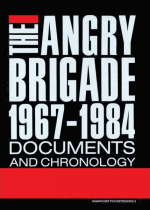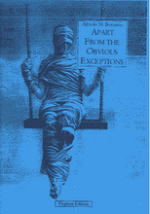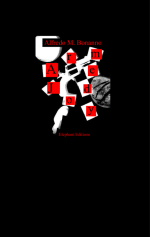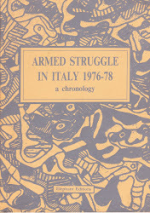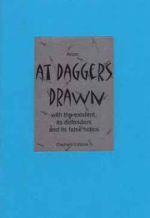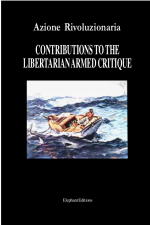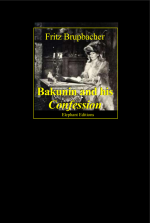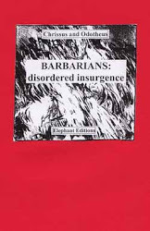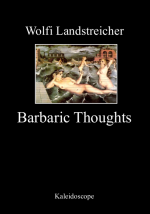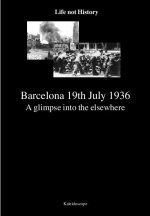Full list of texts
The Angry Brigade 1967–1984 Documents and chronology
Described as ‘mad’, ‘terrorists’, ‘adventurists’, or at best authors of ‘gestures of a worrying desperation’, the Angry Brigade were condemned without any attempt to analyse their actions or to understand what they signified in the general context of the class struggle in course. The means used to justify this were simple: by defining the actions of the Angry Brigade as ‘terrorist’, and equating this with ‘individualist’, the movement organisations—whose tendency is to see the relationship between individual and mass as something in contrast—neatly excluded them from their concerns.
Feb 23, 2017 Read the whole text...
Alfredo M. Bonanno
Apart from the Obvious Exceptions
The appeal trial in Rome in which anarchists were accused of belonging to a clandestine armed organisation has concluded with higher sentences than those meted out on the previous occasion. That was in the logic of things. In my case I was sentenced to six years, i.e. an increase of two and a half years for a robbery in Rome which, needless to say, I know nothing about. If on the one hand the fact that there was no sentence for ‘armed organisation’ or ‘terrorism’ — to use the terms of the law — can be considered a defeat for the dogged zeal of general prosecutor Marini, the above-mentioned personage has every reason to feel pleased concerning the diatribes that this trial has led to within the anarchist movement.
Feb 16, 2017 Read the whole text...
Alfredo M. Bonanno
Armed Joy
Why on earth did these dear children shoot Montanelli in the legs? Wouldn’t it have been better to have shot him in the mouth? Of course it would. But it would also have been heavier. More vindictive and sombre. To lame a beast like that can have a deeper, more meaningful side to it that goes beyond revenge, beyond punishing him for his responsibility—fascist journalist and bosses’ lackey that he is.
Feb 1, 2017 Read the whole text...
Bratach Dubh, Elephant Editions
Armed Struggle in Italy 1976–78
A chronology
The years covered by this pamphlet mark an important period for the whole of the movement against capital. It was at this time that the antagonist movement in Italy finally shed all its taboos concerning destruction, violence and the use of arms against the class enemy.
Feb 15, 2017 Read the whole text...
At Daggers Drawn with the Existent, its Defenders and its False Critics
One part of this society has every interest in continuing to rule, the other in it all collapsing as soon as possible. Deciding which side one is on is the first step. But resignation, the basis of agreement between the parts (improvers of the existent and its false critics) is everywhere, even in our own lives — the authentic place of the social war — in our desires and resoluteness, just as in our little daily submissions. With all this it is necessary to draw daggers, to finally draw daggers with life.
Feb 3, 2017 Read the whole text...
Azione Rivoluzionaria Contributions to the libertarian armed critique
An armed revolutionary organization is an indispensable instrument in the struggle against oppression. This is beyond doubt. The problem arises with regard to the limits and structures that this organization must give itself in recognizing itself as a means and not as an end.
Jan 20, 2018 Read the whole text...
Fritz Brupbacher
Bakunin and his Confession
In a book on the first International, Gustav Jaeckh, a pre-war social-democracy writer, called Bakunin “eine politische Verbrechernatur” (a nature of political criminal). If a wrecker of law is a political criminal, Mr. Jaeckh is right. Bakunin wants to break all the tables of law that restrict human nature. Bakunin, by putting man above the law, is truly, by his nature, a criminal, a wrecker, like all great men. And when Jaeckh finds this frightening, this author simply shows that his fellows are missing something in order to understand human greatness. Bakunin demands the suppression of all that opposes, in “law”, the fruitful becoming of man. Bakunin is with what is new, with what becomes, with the future, against the past, the present, the traditional. He is with the fecundity of chaos against what is condemned to die. Bakunin is a Promethean nature; alongside him Kropotkin is a kind of George Sand and Marx a red policeman, a Ghepeu official.
Aug 28, 2024 Read the whole text...
Chrissus and Odotheus
Barbarians
the disordered insurgence
Why take the trouble to criticize the theses of Empire, when reality has so generously seen to it? Certainly not because it is a successful book, talked about in universities and on television. Discussions of opinion don’t interest us. We criticize the ideas of Negri (and Hardt) because they are a practical force, since they represent the most lucid version of the program of the left-wing of capital today and influence a movement — the “disobbedienti” — capable of supporting such a program. “Disobedient” politics, in fact, represents an excellent terrain of experimentation for the democracy of the future.
Feb 11, 2017 Read the whole text...
Wolfi Landstreicher
Barbaric Thoughts
On a Revolutionary Critique of Civilization
I am convinced that a revolutionary challenge to the current social order must necessarily be a challenge to the last ten thousand years of institutional development that have created it. In short, revolutionary critique must aim at civilization itself. But what precisely does this mean?
Apr 20, 2022 Read the whole text...
Barcelona 19th July 1936 A glimpse into the elsewhere
A glimpse into the elsewhere of an upturning so great that it is unimaginable, where certainties are swept away in an instant and life itself takes on a fragile intensity. These accounts contain a grain of everything it is possible to foresee of the ultimate fight for freedom and other aspects that could never have been dreamt in our worst nightmares. They inform, inspire but also warn: we need to recognise the enemies of freedom and self organisation in the paths we tread, blinded by our iconography of the enemy which is also standing right next to us and calls us comrade, albeit hissed through clenched teeth.
Jul 22, 2021 Read the whole text...
Series
Fragments
Work in Progress
Anarchist Pocketbooks
Kaleidoscope
Anarchist Pamphlets
Bratach Dubh
Detritus
Drafts
Déjà vu
Insurrection (PDF)
Contact
e-mail: elephanteditions [at] riseup.net
Distributions
In Europe, Elephant Editions are distributed by Active Distribution
In the United States, Elephant editions are distributed by AK Press
In Italy, Elephant Editions are distributed by Edizioni Anarchismo
Other distributions please get in touch.

